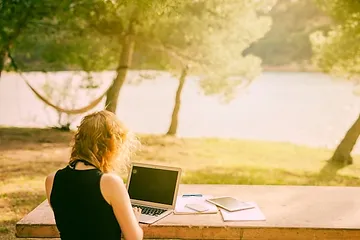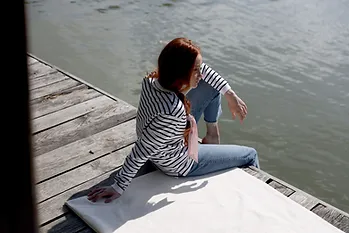Is Something Missing or Am I Burned Out?
“It feels like something is missing.” From time to time, I hear this from clients. It evokes a special kind of empathy because there have been seasons in my life when I have asked myself the very same question. Recently, I found myself in a season that caused me to ask this question too, but specifically in one area of my life--my work.
Don’t get me wrong. I love what I get the privilege of doing every day! (#therapist #author #teacher). But not that long ago, I went through a period of time where I found it exceptionally difficult to do “all the things.” This was particularly disturbing because it came at a time when there wasn’t a lack of “things” that needed doing. The problem was that the energy/motivation/creativity/drive to do them was in short supply.
For any of us, (a-hem) type A, “pile-my-plate-higher-please” type people, a struggle like this can be a risky thing to admit. Particularly for someone in my line of work. But after all, I am first and foremost a human, and I find my struggles hold more purpose if I get the privilege of sharing the lessons I learn from them to help others. Perhaps this one can help you.
Am I Just Burned Out?
Initially, I thought I was experiencing a classic case of burnout. It made the most sense, given all the classic symptoms were present: fatigue, a sense of overwhelm, anxiety, lack of motivation and creativity.
So, I took the naps, worked with a fellow therapist on what felt overwhelming, employed all the tools and techniques to combat the anxiety. I gave myself permission to really rest. And while all that was helpful, it didn’t "fix" the issue. I still found myself asking the same question.
Is It Grief?
A little-known fact: after completing and celebrating a big project, especially one that requires us to pour out a lot of our personal and professional experiences, there comes a significant let down.
When you spend years on a project like I just did (it took five years to bring Generations Deep to life) you go through a lot of emotions. The process of outlining, crafting, tweaking, collaborating, putting your work in front of others for feedback, releasing it into the world and having said world respond, is a deeply vulnerable process. An opus of such magnitude is so consuming that it becomes a part of who you are- not just something that you are doing.
So, when you’ve reached your goal- when you get to celebrate and share your accomplishment, the quiet that follows is hard to explain. It feels like something is missing; like the sorrow of parting ways with a dear friend who’s been with you on a long journey, then leaves when the journey is over- grief becomes inevitable.
However, I’ve given myself time to process the emotions that came with birthing the book, and I recognize that I’m still in the process-even though it looks different now, as other, related projects have spun from this one. Still, I continue to make room for feeling my feelings, because I know to do less is unhelpful and unhealthy. Grief can be uncomfortable, but refusing to feel it is damaging and can lead to us getting stuck. And while all this helped, it still wasn't the answer I was looking for.
Is It Physical?
It’s easy to forget just how much our physical wellbeing affects our emotional and mental health (and vice versa). Things like poor diet, lack of movement and vitamin deficiencies can all contribute to fatigue and higher levels of inflammation, which can lead to foggy brain, low mood, lack of emotional and mental energy, and a whole host of other challenges.
When you have a job like mine that requires much more sitting than moving, it can be easy to lose track of how sedentary you become. Realizing that my nutrition and physical fitness had gotten away from me, I had already begun to work on a reset, setting doctor appointments, a nutrition overhaul, exercise routine, supplements, blood tests, balancing hormones and on and on. All of which I think is important and should not be discounted. Still, this wasn’t the answer to my question about something important being absent.
Is It Spiritual?
This is perhaps the most over-looked area of our wellbeing. Just as it’s easy to overlook our physical health, it is easier still to overlook our spiritual health. I recognize this looks different for different people, but throughout my journey I’ve learned the profound effect my spiritual health has on my health overall.
And something I began to notice many years ago is that often, when I’m attempting to do something that has the potential to make a difference in the lives of others- a chance to shine light in dark places, or speak truth where lies have been sewn, it is in these times when inevitably, some sort of minor (or major) struggle will present itself.
Sometimes it’s personal, other times it hits the life of a family member or close friend- seeking to draw my attention and intentions away from what I need to focus upon. These events seem as though they’re orchestrated by a force that wishes to thwart my efforts to make a difference.
Coincidence? I think not.
Darkness hates light. Any time you are working to shine light in dark places, don’t be surprised when something seems to be fighting against you. (IYKYK)
If we’re not taking care of our spiritual health, plugging into our Source, we can find ourselves too depleted to face such challenges when they arise. There have been times in my life when, trying to manage these challenges from my own strength I’ve found myself beyond exhausted, experiencing a special kind of empty that nothing of this world can repair. I have learned to draw close to the One whose strength is endless and far outweighs the supply I can manage on my own. And during the season where I was experiencing such depletion, I was beginning to see this was part of the problem. Sometimes we get so caught up in our pouring out that we forget to look for what pours into us.
Am I Disconnected?
This is perhaps the single most under-recognized potential cause to feeling like something is missing. Why? In part, because we live in a culture that mistakes technical connections for real connections. We spend the bulk of our emotional capital in texts, memes, comments, likes, shares, tweets, posts, and emails- so much so that we convince ourselves that it’s a substitute for genuine, face-to-face connection.
Additionally, at one time or another, we’ve all referred to ourselves as either introverted or extraverted. Some of us have even found nuance for the language to further describe our energy type. (Extraverted introvert, anyone?)
Some of us thrive on time with others. It’s what energizes us. The more the merrier!
But for many people, too much time with others feels like an energy-leech, leaving us depleted and in need of solitude for rejuvenation.
And with this, there are verbal processors and internal processors, those who love a group project and those who only sign up for group projects if the group consists of me, myself and I.
But no matter how introverted someone is- the reality is we are all wired for connection. And while social media and electronic communications can provide some of that, it is still no substitute for time with your people.
It’s true that connection means different things to different people. For me- I’m one of those extraverted introverts. I like my crowds small and I like to create in spaces that spark creativity – in proximity of others who are creating, too. And it was here that I found another clue as to what it was that missing.
The Power of Connection to Fuel Creativity
In Annie F Downs book 100 Days to Brave, Annie talks a lot about the power of connection. In Day 41 of the journey she takes her readers on, she shares this wisdom: “As iron sharpens iron, friends sharpen one another.” And she is onto something.
The research is clear on this, too. If you (responsibly) Google the question “Are we wired for connection,” a whole host of articles and research will pop up. Connection is critical to each of us living our healthiest and most fulfilling lives. And, as Annie intimates, it is also important to us living out our purpose.
Rest, feeling our feelings, taking care of our bodies and spiritual wellbeing, are all important and necessary pieces of the puzzle that make up my healthiest self. But it is connection that brings it all together. And in my "head-down-pedal-to-the-metal-pace" I had forgotten that. I was so focused on my work for others that I had forgotten the benefit of being with others.
Connection energizes me. It reorients me and fuels me creatively. It helps me remember that I’m part of something so much bigger. It realigns me with how I am created. I learned that on the days when the ideas won’t come, when the motivation isn’t present, when the cup feels empty, after I’ve checked on “all the things” that might be contributing, I must remember to check on my level of connectedness- with others, with myself and yes, even with God.
What about you? Are you stuck today? Do you feel like something is missing? Take a few moments to ask yourself the following questions and pay attention not only to what you think about your answers, but how you feel about them.
Ask Yourself:
“Am I burned out?”
“Do I need to grieve or are there other emotions I’ve been avoiding?”
“How am I physically and spiritually? Am I plugged into a Source greater than myself?”
(And last, but certainly not least) “When was the last time I spent time connecting with others? Really connecting? Am I connected within myself? Am I connected to God?"
Give yourself permission to seek out what you need, then share your experience with others. Help spread the message that it’s ok to tend to our own needs. In doing so, we fill our cup and that is the only way we can be truly effective in our attempts to pour into others.
If you are interested in embarking on a journey to build your “brave muscles,” check out Annie F. Downs powerful book, 100 Days to Brave (Amazon.com : 100 days to brave). In it, Annie helps us explore what contributes to feeling like things are too hard, too scary or too much for us to handle. Whether you’re in transition, facing a tough road, embracing something new or creating something different, Annie points us toward learning to recognize that we are braver than we know and stronger than we think. If you found this article helpful- consider sharing it with a friend.)



